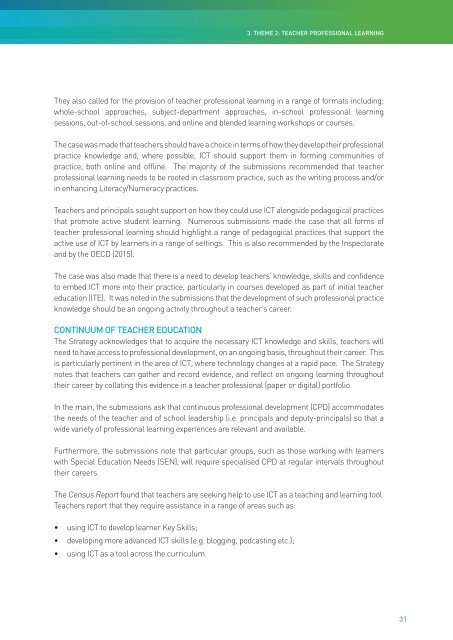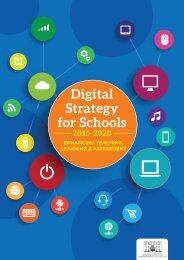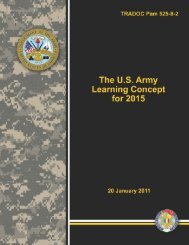Digital Strategy for Schools
TKmc0
TKmc0
Create successful ePaper yourself
Turn your PDF publications into a flip-book with our unique Google optimized e-Paper software.
3. THEME 2: TEACHER PROFESSIONAL LEARNING<br />
They also called <strong>for</strong> the provision of teacher professional learning in a range of <strong>for</strong>mats including;<br />
whole-school approaches, subject-department approaches, in-school professional learning<br />
sessions, out-of-school sessions, and online and blended learning workshops or courses.<br />
The case was made that teachers should have a choice in terms of how they develop their professional<br />
practice knowledge and, where possible, ICT should support them in <strong>for</strong>ming communities of<br />
practice, both online and offline. The majority of the submissions recommended that teacher<br />
professional learning needs to be rooted in classroom practice, such as the writing process and/or<br />
in enhancing Literacy/Numeracy practices.<br />
Teachers and principals sought support on how they could use ICT alongside pedagogical practices<br />
that promote active student learning. Numerous submissions made the case that all <strong>for</strong>ms of<br />
teacher professional learning should highlight a range of pedagogical practices that support the<br />
active use of ICT by learners in a range of settings. This is also recommended by the Inspectorate<br />
and by the OECD (2015).<br />
The case was also made that there is a need to develop teachers’ knowledge, skills and confidence<br />
to embed ICT more into their practice, particularly in courses developed as part of initial teacher<br />
education (ITE). It was noted in the submissions that the development of such professional practice<br />
knowledge should be an ongoing activity throughout a teacher’s career.<br />
CONTINUUM OF TEACHER EDUCATION<br />
The <strong>Strategy</strong> acknowledges that to acquire the necessary ICT knowledge and skills, teachers will<br />
need to have access to professional development, on an ongoing basis, throughout their career. This<br />
is particularly pertinent in the area of ICT, where technology changes at a rapid pace. The <strong>Strategy</strong><br />
notes that teachers can gather and record evidence, and reflect on ongoing learning throughout<br />
their career by collating this evidence in a teacher professional (paper or digital) portfolio.<br />
In the main, the submissions ask that continuous professional development (CPD) accommodates<br />
the needs of the teacher and of school leadership (i.e. principals and deputy-principals) so that a<br />
wide variety of professional learning experiences are relevant and available.<br />
Furthermore, the submissions note that particular groups, such as those working with learners<br />
with Special Education Needs (SEN), will require specialised CPD at regular intervals throughout<br />
their careers.<br />
The Census Report found that teachers are seeking help to use ICT as a teaching and learning tool.<br />
Teachers report that they require assistance in a range of areas such as:<br />
• using ICT to develop learner Key Skills;<br />
• developing more advanced ICT skills (e.g. blogging, podcasting etc.);<br />
• using ICT as a tool across the curriculum.<br />
31




